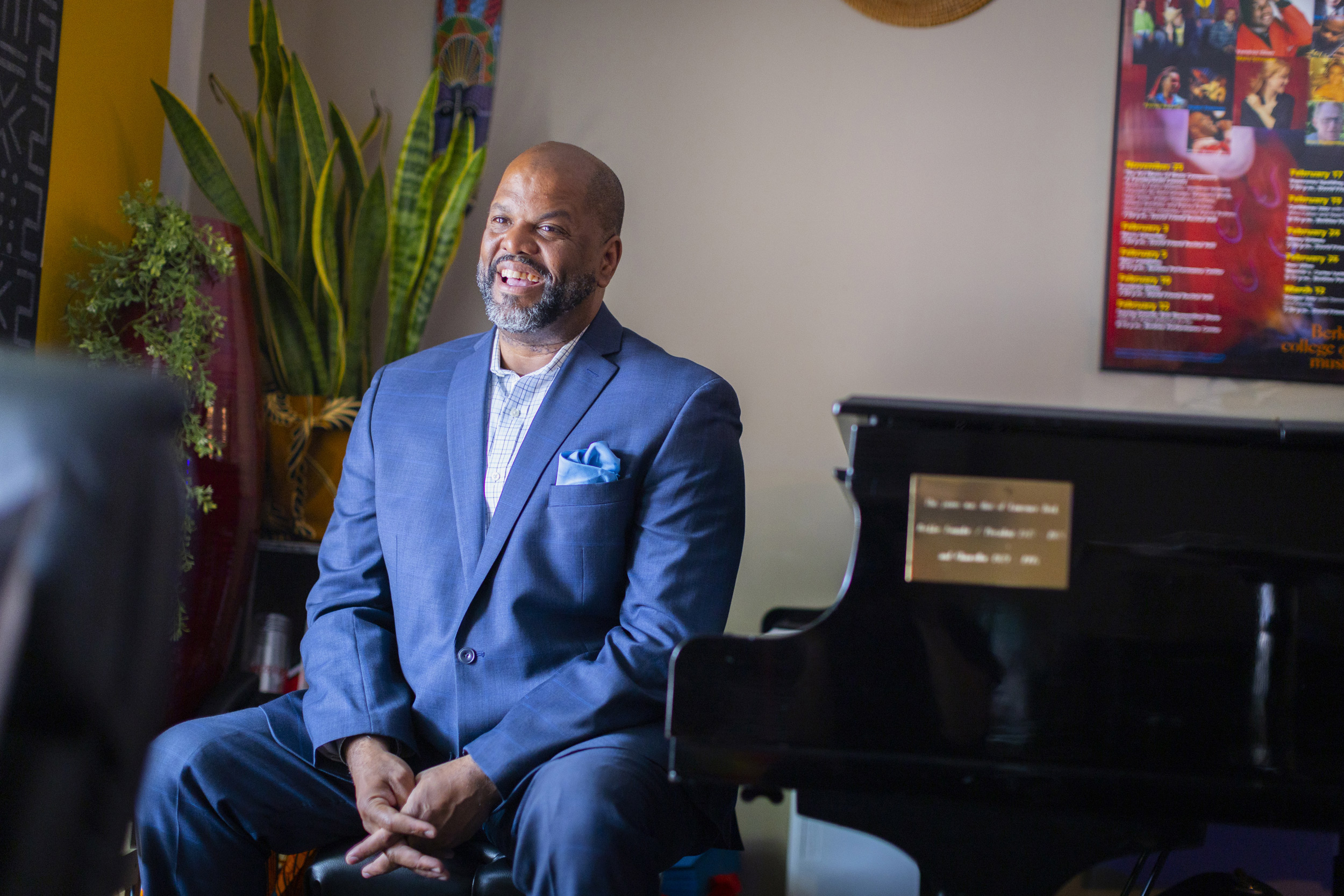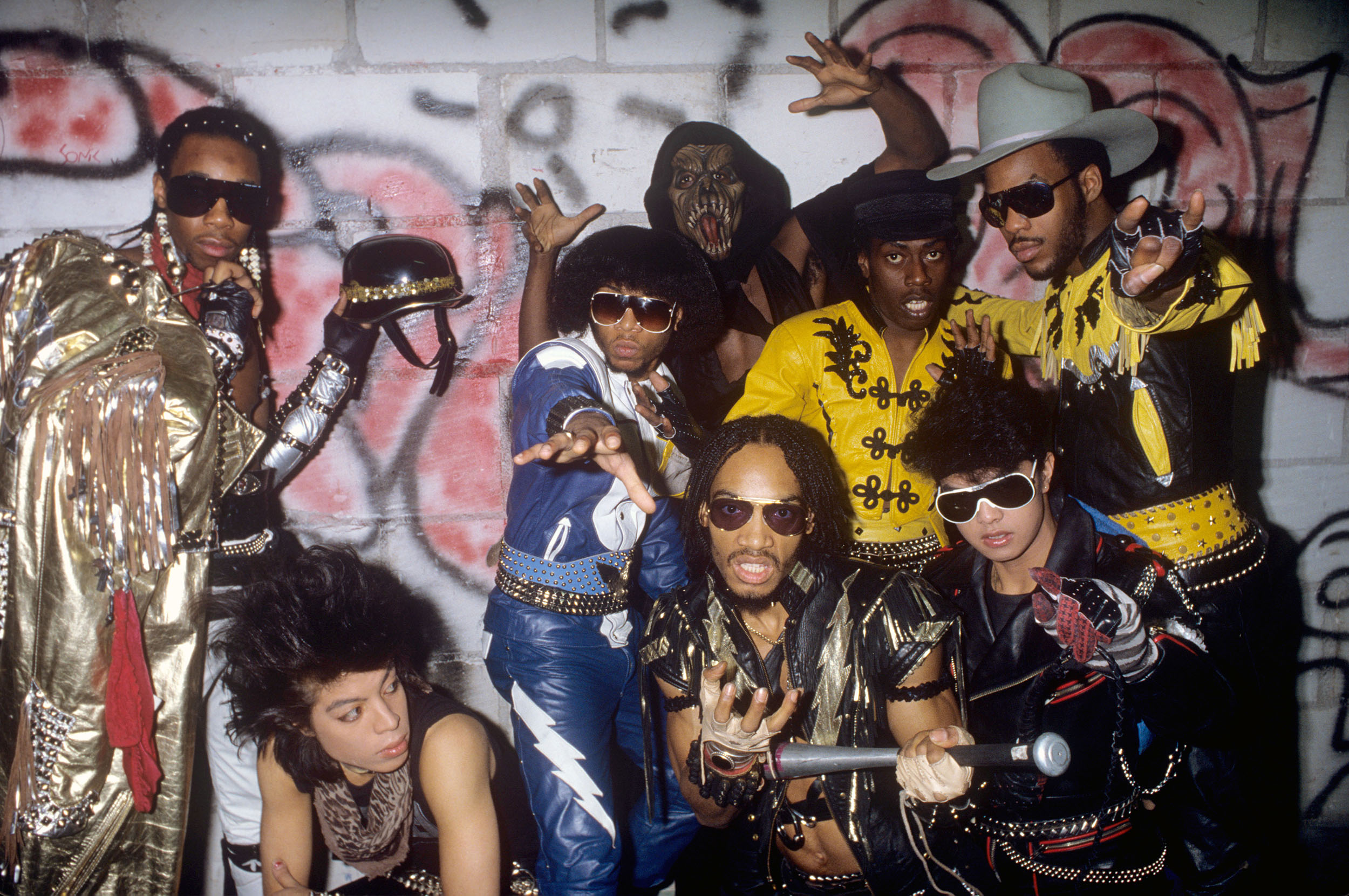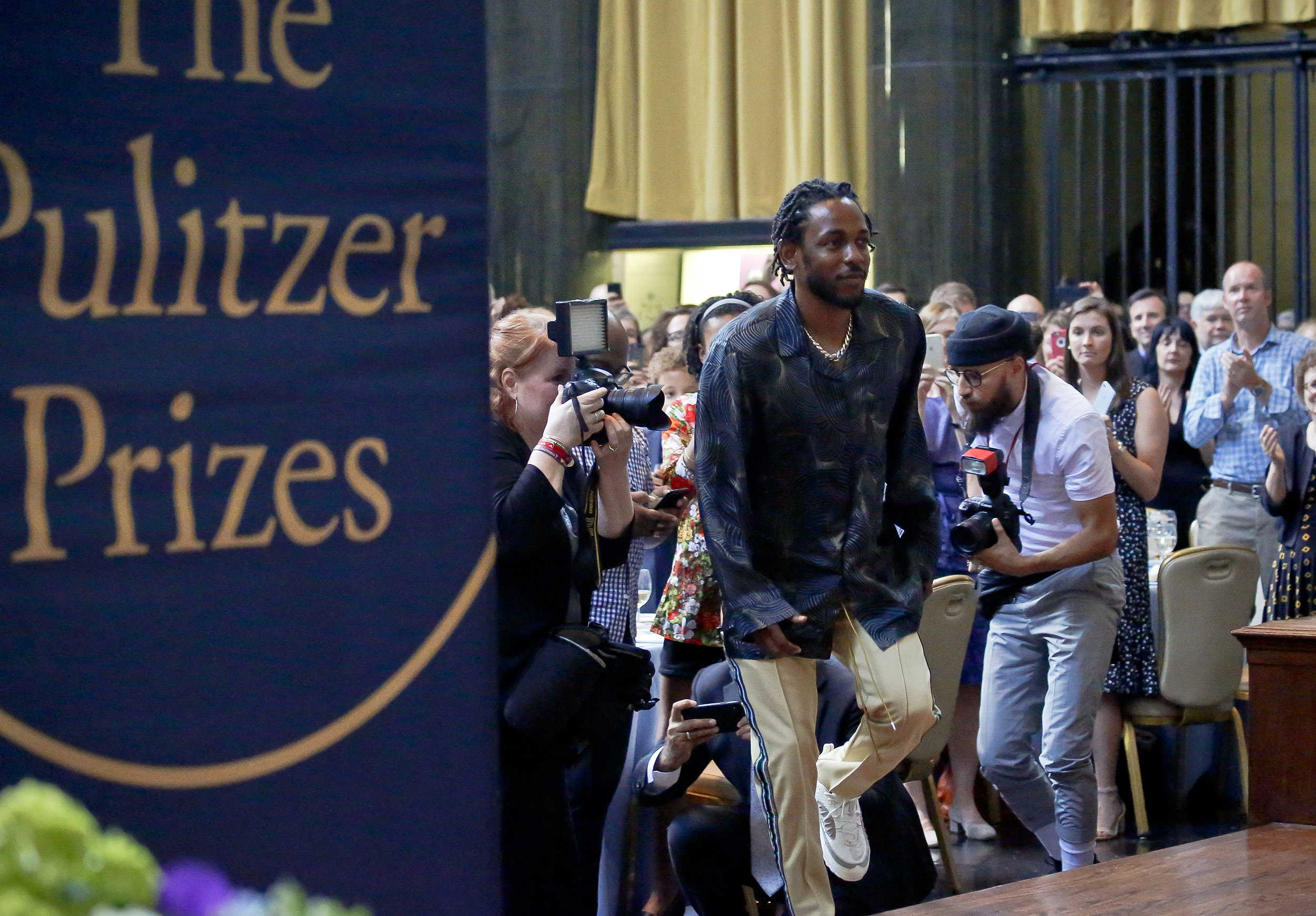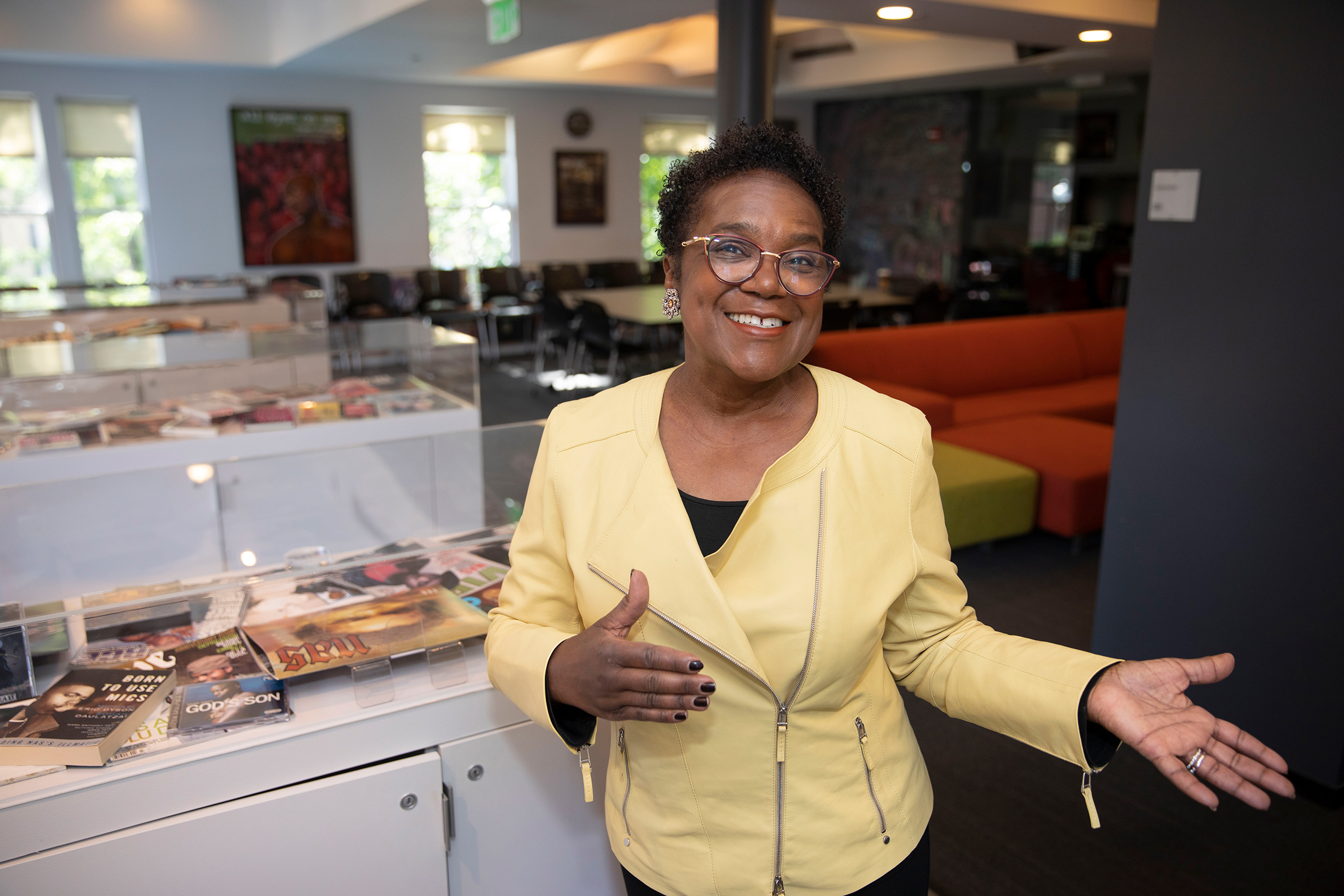
Emmett G. Price III, dean of Africana Studies at Berklee College of Music and 2022-2023 visiting professor of music at Harvard University.
Stephanie Mitchell/Harvard Staff Photographer
Reflections as hip-hop turns 50
Black music scholar examines genre’s history, staying power — and ‘intentionality’ of recognition in recent years from elite cultural institutions
When Cindy and Clive Campbell threw that back-to-school party on Aug. 11, 1973, in the rec room of their apartment building in the Bronx, they had no way of knowing they were about to change music and pop culture forever.
Clive, known as Kool Herc, emceed and DJed that night, mixing elements of Jamaica’s dance-hall traditions with house party basics. It was a novel mashup that stayed largely underground until the 1979 landmark hit “Rapper’s Delight” introduced the world to rhyming stories over a groove or beat and to the phrase “hip-hop.” Fifty years later, rap has supplanted rock as the music of global youth culture, and many hitmakers of the ’80s and ’90s, such as LL Cool J, Will Smith, Jay-Z, Diddy, and Pharrell Williams, now control entertainment, technology, and luxury fashion empires.
Emmett G. Price III, dean of Africana Studies at Berklee College of Music and 2022-2023 visiting professor of music at Harvard University, has written extensively about hip-hop culture and the history of Black music. Price spoke with The Gazette about the genre’s enduring influence. The interview has been edited for clarity and length.
Q&A
Emmett G. Price III
GAZETTE: Many elements of Jamaica’s modern musical customs — mobile sound system parties, emceeing over records, mic battles — were present at those first parties. And the genre’s emphasis on narrative and lyric poetry, on truth-telling and embellishment, comes out of African oral tradition. Where does hip-hop fit in the continuum of Black music history?
PRICE: You’re absolutely right in terms of hip-hop being a diasporic cultural expression within the trajectory of the Africanist expressive culture that comes through the Caribbean and South and Central America into the United States. Not only toasting and DJing, but also dance rhythms and dance moves that come from the African continent we see manifested in breakdancing, and then, the role of the griot — the storyteller, the praise singer, the one who narrates and chronicles the daily activities of what it means to be in the life of. That’s what we get in the emcee. Perhaps Aug. 11, 1973, is not the magical date, but that may have been the moment that those young people recognized that they had something significant and special.
The other piece is that these young people were ostracized; they were disenfranchised; and they were literally left behind, so the whole notion of hip-hop culture comes through the urgency of resilience in order to survive. That is a trope or narrative within Black expressive culture that goes back through the Middle Passage or the Maafa (the African Holocaust), through the enslavement period, Reconstruction, and whatnot.
So yes, hip-hop culture and rap music has a bigger narrative than just in the United States in the 50-year range we’re looking at.
GAZETTE: Many assumed hip-hop was a New York City or East Coast fad that would fade away once the next new musical style came along because that’s often been the history with popular Black music. Why has this music had such staying power?
PRICE: In many ways, music critics during the Negro Renaissance tried to ruin Duke Ellington’s career by calling his music “jungle music” when what he was trying to do was narrate, through a musical soundscape, the journey from Africa to America.
Many tried to quash Charlie Parker and Dizzy Gillespie and Bud Powell and Thelonious Monk’s careers by suggesting the music was off, that it was too aggressive and whatnot. And yet, contemporary artists still use that repertoire, still use those genres as muses. Those genres still exist as source material in terms of how we remix and mash up and remake and reimagine Black creative expression.
Rap music and hip-hop culture don’t exist outside of Roy Ayers or James Brown or so many classic musicians — there would be no “Rapper’s Delight” without Chic. So, the use of existing material as muse, but also, as signifying on a communication that is coded. When you play the riff to James Brown’s “Say It Loud, I’m Black and I’m Proud,” and don’t use the lyric, you just use that bassline, that’s signaling something.
As much as hip-hop culture looks forward, it also looks back and it reclaims that which was used to ruin or to quash the voices of Black creatives. Hip-hop culture did what other movements were not able to do, which is to coalesce and build synergy and build energy around this idea that the voice matters, that the people matter, and the sentiment of human existence matters.
GAZETTE: Why did the music and culture have such an immediate and lasting impact on global youth culture — on people who did not have the same life experiences as those who created it? They were not American, Black, or Latino; they didn’t live in the grim socioeconomic conditions of 1970s and early ’80s New York City, and largely hadn’t faced systemic racism or police brutality or gang violence.
PRICE: It’s the same thing that happened with blues and jazz and R&B and soul music. One of the most common similarities within the human condition is suffering. And the challenge of humans is trying to figure out what to do with our suffering. What the early hip-hop artists did was they taught us how to suffer in the most honest, most transparent, and the most genuine and authentic manner that they knew.
In “The Message,” Grandmaster Flash and the Furious Five said, “Don’t push me ’cause I’m close to the edge/ I’m trying not to lose my head” and you get the nervous laughter, ah huh huh huh, “It’s like a jungle sometimes/ It makes me wonder how I keep from going under.”
What human being has never felt that? All of us have felt that sense of relating to this deeply honest and transparent emotion. Whether it’s in the Bronx or the five boroughs of New York City or my hometown of Los Angeles, we understand what it means to have our necks under the knee of capitalistic interests, and we understand what it means to be the least of these interests or the lesser of the 99 percent versus the 1 percent, or however you articulate that binary.
People around the world understand that as well. Around the world, hip-hop has been used to mobilize, to create progress for liberation, to express needs and concerns of freedom.

Grandmaster Flash & The Furious Five in 1984.
Via AP
GAZETTE: Many who grew up during hip-hop’s “golden age” — approximately 1985 to 1996 — say the music today isn’t as good because the marketplace is saturated with lower-quality product. Those critics point to digital technology, which makes it possible for virtually anyone to record and put out tracks. Was hip-hop better when industry gatekeepers had more control?
PRICE: Early hip-hop or rap music was really generated through neighborhoods and each neighborhood had essentially a gang that had its own stomping ground — a discotheque or watering hole — and each gang had their own DJ. And as these gangs decided to stop killing each other and to figure out how they could leverage their social location and their desire to have life and a livelihood came together, they created something that didn’t exist.
That’s different than a label deciding to put a roster together and different than some distribution company saying, “We’re going to take this label and this label and this label under our wing.”
By the ’80s, you have corporate interest in this burgeoning movement and they begin saying, “Hey, NWA. If y’all can be more graphic and more incendiary and use even more slang, we will sign you and make you rich.” I was there; I watched it happen. I’m not sure if hip-hop created the industry or if the industry took advantage of hip-hop, but there has definitely been an interesting give and take.
“As much as hip-hop culture looks forward, it also looks back and it reclaims that which was used to ruin or to quash the voices of Black creatives.”
I’m not sure you can compare. But what I can say is the allure of hip-hop culture is that everybody can participate — from a creative standpoint and a standpoint of inclusivity, with a critical eye to diversity, equity, and belonging.
I like the fact that young kids can do what we used to do back in the day — pound the beat on their lunchroom counter and throw some rhymes over that and feel like they’re doing something. I also love that college students can pull up Garage Band or some of the more advanced technology and put a track together and feel like they can say what they weren’t able to say in the classroom or at the dining room table with their parents. And so, that small-d democratic piece around hip-hop culture, I love that.
The challenge is when you get to the economics of it. Does everybody who creates, is their desire to create in order to make millions? That’s where we have a problem.

In 2018, Kendrick Lamar accepts the Pulitzer Prize for his 2017 album “DAMN.”
AP File Photo/Bebeto Matthews
GAZETTE: Major cultural institutions have lauded a number of artists in recent years. Kendrick Lamar won a Pulitzer Prize in 2018; LL Cool J was honored by the Kennedy Center in Washington, D.C.; Jay-Z was inducted into the Songwriters Hall of Fame. Are these examples of long-overdue recognition or signs that the genre has been co-opted by corporate America?
PRICE: You can add “Hamilton” to that list. We all evolve, and institutions have to evolve, particularly those institutions that are supposed to be markers of elite intellectual property and intellectual culture.
I think it’s a great thing. I remember back in the early 2000s, I wrote a hip-hop curriculum at Brandeis, and a number of colleagues and I were writing the curriculum at Northeastern when I was there. It was both revolutionary and the most insidious thing [according to] our senior colleagues, “Why would you teach that crap?”

Marcyliena Morgan, founder and executive director of Harvard’s Hiphop Archive & Research Institute.
File photo by Kris Snibbe/Harvard Staff Photographer
Now, most institutions of higher learning have a hip-hop something. Harvard has a phenomenal Hiphop Archive under the leadership of Dr. Marcyliena Morgan. So, there’s space for the evolution of our thinking around what is valid, valuable, and worthy of attention, whether it’s from the Pulitzers, the Grammys, the Kennedy Center, Broadway, or from the ivory tower.
I think it goes back to intentionality. Is the Pulitzer board giving Kendrick Lamar a prestigious award and a nice check because they want to say, “We’re relevant, and we get it”? Or are they doing it because they actually care about the art form and the tremendous global reach and influence of the art form?
Do I think Kendrick Lamar deserves it? Of course! But the question is always about intentionality: Do we leverage hip-hop to say that we’re not racist, or do we actually listen to it and interrogate it and analyze it because we care about what the voices of the people who create it, and the people who they represent, care about? I think that’s the question for us.







